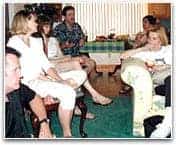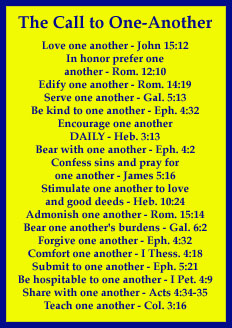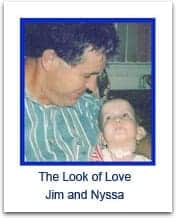The Joy of Letting Go
By Wayne Jacobsen
BodyLife • April 2002
 When my daughter Julie invited me to go kayaking with her around the Channel Islands Harbor, I thought it would be a leisurely afternoon. As soon as I crawled off of the dock into the kayak for the first time, however, I realized I might have been a bit optimistic. Bobbing on top of the water, the little craft felt horribly unstable.
When my daughter Julie invited me to go kayaking with her around the Channel Islands Harbor, I thought it would be a leisurely afternoon. As soon as I crawled off of the dock into the kayak for the first time, however, I realized I might have been a bit optimistic. Bobbing on top of the water, the little craft felt horribly unstable.
The slightest shift of weight caused it to start rolling, threatening to dump me into the cold waters of the harbor. When I adjusted my weight to compensate, I overcorrected and the boat would begin to roll in the opposite direction. As I shifted and reshifted multiple times in a few seconds my kayak quivered like a bowl of Jello in a California earthquake.
I honestly wondered if this had been such good idea. If I was having so much trouble in the calm waters by the dock how would I ever fare in the chop of the open water? Julie was already rowing around the dock. I only had a few seconds to choose whether or not to let go and sort it out in the going or stay holding on to the dock, looking like a wimp and missing out on the last special father-daughter day I would have with Julie before she got married.
Uncertain though I was about my ability to stay dry, I pushed away from the dock and learned how to stabilize the kayak and guide it into the open water. It took a while. Every move in the boat felt awkward until I got used to it. Even reaching for the paddle sent my kayak quivering again. I never regretted it, though. Eventually I learned how to row the kayak and we had a joyful afternoon cruising the harbor together – racing, splashing, laughing and enjoying the sights and the conversation.
I’ve thought about that day many times since because it mirrored so much of my life over the last decade. For so long I’ve sought a relationship with Jesus that fulfilled the promise and example of Scripture. Though I’d had tastes of it from time to time, the reality always seemed to fade away just as I got closer. I didn’t realize it at the time, but looking back, I know I was holding on to the dock. Afraid to follow his invitation to the open water, I clung to that which gave me temporary stability and security.
I had no idea that serving my desire for security and trying to follow Jesus were at odds with each other. No wonder my faith seemed so temporary and fruitless. Life in him can’t be lived holding on to the dock because of our insecurities. At some point we have to push away and only then can we learn how to live this incredible life in Jesus.
Missed Opportunity
I first met him almost eight years ago, and though we had exchanged some emails from time to time we had not had an opportunity to catch up in many years. Last month I ended up among a group of believers just beginning to sort out what it might mean to journey together. They wanted to ask me some questions about relational Christianity and how they might experience it in their newfound life together.
What an evening! We talked about how the institutional pressures they were already feeling were at cross- purposes with the priorities of the kingdom. To live in his fullness we have to learn how to enjoy God’s working rather than trying to control it. That’s not easy for any of us. After that evening I finally got the chance to sit down with my friend. Somehow our discussion that evening had disturbed him at a far deeper level than I would have guessed. He told me that seven years before our relationship had touched a deep hunger in him to walk closely with the Lord.
As he set out to do that, however, he noticed not too many others shared his hunger. What if he missed God in his pursuit and how would that affect his young family? Eventually he ended up getting involved in a ‘nice’, ‘safe’ fellowship of believers. It seemed they preferred to talk on the dock rather than climb in their kayaks, because in that fellowship his hunger for the life of God quickly waned. He hadn’t even noticed it until that evening when his old passion had been reawakened.
“I’m not going to miss it again,” he said looking up at me. “I came so close last time and this time I’m going to follow him no matter what it takes.”
His story is not unique. I’ve known many people who have had a deep passion to live the fullness of God’s life, but few of those actually ended up finding out how. The risk of riding the waves with him sends them scurrying back on the dock. Jesus warned us about that. “Any one who holds on to life just as it is destroys that life. But if you let go, reckless in your love, you’ll have it forever, real and eternal.” (John 12:25, The Message)
It seems our desire for security in temporal things is enemy number one to the very life we desire to find in him.
Relax!
I realize it isn’t an easy lesson to learn, but Jesus knew it was the key to life in him. In one of my favorite passages from The Message, Jesus wants them to learn how to let go of their anxieties and find out how richly God cares for them:
“What I’m trying to do here is get you to relax, not to be so preoccupied with getting so you can respond to God’s giving. People who don’t know God and the way he works fuss over these things, but you know both God and how he works. Steep yourself in God-reality, God-initiative, God-provisions. You’ll find your everyday human concerns will be met. Don’t be afraid of missing out. You’re my dearest friends! The Father wants to give you the very kingdom itself!” (Luke 12:29-32)
I have found that to be so true. When I was preoccupied with getting the things I thought I needed to be a successful believer, I got further and further from it. When I finally gave up trying to get what I wanted from God and started just enjoying what God was bringing into my life, everything changed. I’m no longer frustrated by what God hasn’t yet done in my life, but blessed at every glimpse of mercy he shares with me. The joy of this life cannot be reached by our attempts to grab hold of God or his blessings, because we only end up grabbing those things that make us secure in ourselves. God wants us to find our security in the only place it really counts, in him!
Notice how that trust is deeply rooted in how his Father feels about us. Jesus wanted us to know that he does not withhold his glory or make us earn his favor. We’re his dearest friends! He wants us to experience the fullness of his life, and the best way we do that is to be learning to relax and let go of our need to control our own lives and define security on our own terms.
People who fuss, grab and manipulate simply don’t understand how God works. What a statement! I had no idea that my anxieties were the best evidence that I had simply not learned how God works. Because I didn’t trust him to bring into my life all that I needed to walk in him, I had to scheme and labor to try and get it for myself. And even when that doesn’t work, we don’t consider that our approach to God is flawed, only that we’re not working hard enough. So instead of giving up and learning to let go, we have to try even harder.
Of Systems and Spirit
Jesus is inviting a new generation of his followers to learn how to live dependent on the awesome love of his incredible Father. Isn’t it interesting that we have built most of our religious institutions on the fear that we can’t trust him to lead his people and therefore must provide programs and rituals to make people feel secure? Unfortunately we end up spending more energy building substitutes for people to trust in instead of equipping them to fully trust him.
A number of years ago I had begun to write a book as a follow-up to The Naked Church about New Testament approaches to church life. The working title was, “A New System”. I quiver now to think about that, but that was a kayak of a different color. I was teaching groups all over the world how to do church differently and gave them what I’m still convinced were Biblical priorities, but they were also laced with human methodologies that could not produce what they promised.
Only after the system I had helped build imploded due to competing agendas among believers, did I come to realize that my system of doing church was just another system to add to all the systems men and women have devised since the earliest days of Christendom.
A friend from Australia helped me see that as powerful as my passions might have been we were being under cut by the methods we employed. “Jesus did not leave us with a system,” he said, “but his Spirit.” Then he asked me an eye-opening question. “Wayne, how much of your method of church was built because you were afraid someone would fall through the cracks, go off into error, or misuse others in the body?”
“About 90% of it,” I answered half joking.
But he knew better. “Then what you’re saying is that 90% of your view of church was based on fear not on trust.” Exactly. That’s why it could not contain the fullness of Christ’s work. The lesson he wants us to learn is how to trust him and let go of our own ingenuity and wisdom.
Letting Go!
The best decision I’ve made in the last decade was also the most painful. Brothers and sisters I had worked with for nearly fifteen years were using half-truths, rumor and gossip to discredit me because I refused to conform to their authoritative view of leadership in the body of Christ. When the plot finally unraveled, I had them. It would have been so easy to expose their lives and reassert my place in that fellowship.
But God told me to let go. He asked me to walk away from people I loved and the fellowship I had helped to build. I’ve always been a competitor and to walk away from a fight I knew I could win was the hardest thing God ever asked me to do. And even when I did it, I thought it would last a few weeks before everyone would come to their senses and love each other again.
But it wasn’t to be! In those days, letting go of the dock meant giving up the only vocation I had known, the salary I depended upon, and control of my reputation to those who had chosen to spread malicious gossip about me. I cannot describe to you the pain of those days and how disoriented I felt. Nothing worked out like I thought it would to guarantee my success and security. I had other job offers to run to but I turned them down because of a nagging sense in my heart that God had given me an amazing opportunity to sail away from a dock of my own security and find out what life in his kingdom really meant.
I would not trade one lesson learned in the last seven years for my old position or reputation. It took me a number of months to learn how to keep the ‘kayak’ from quivering and to paddle in the open waters God had beckoned me to enjoy with him. I’ve never regretted it. I’ve found God’s life and his character to be everything he said he was. I’ve found relationships with other believers filled with joy and depth that I never thought possible.
Now finding my security in him instead of things, systems and other believers has become almost second nature. I am so grateful I chose not to grab for what I wanted most and have discovered that his generosity and presence is the safest place. Every night as I settle down in bed somewhere in this world, I am truly amazed at how he touched my life on that day. I no longer live with the enduring frustration with what God isn’t doing in my life, but with overwhelming joy of what he is doing.
There is no greater peace.
Living Openhandedly
I’ve come to realize that seeking after possessions, popularity, or influence are not beacons on the path to life, but traps that rob our freedom. John the Baptist said as much when people suggested that Jesus was becoming more popular than he was. “A man can only receive what is given him from heaven.” (John 3:27)
Paul echoed those same words. Frustrated that believers in Corinth were missing God’s life because of constant comparing themselves to each other and boasting in their efforts, Paul wrote, “What do you have that you did not receive? And if you did receive it, why do you boast as if you did not?” (I Corinthians 4:7) When you realize that all of your life is in the Father’s hand, then you can really live free.
Both John and Paul kept their dependency centered on Christ. When others tried to put their focus on things the world uses to measure security or success, they rebuffed it. They knew that real freedom is not found in how much you have, but only in the joy of following him.
When you no longer need to grab on to anything for security you will find yourself living with an open hand with others as well. Living in the joy of God’s life means that in every situation we don’t have to protect ourselves or look out for our best interests, because God will and he is so much better at it than we are. We tend to self-destruct when we get grabby and are more gracious when we’re not.
When you are really free in him you can walk into any situation with nothing to lose, nothing to gain, and nothing to prove. That’s what it means to live openhandedly and when we do that we are in a much better place to see what God is doing and flow along with him. You’ll find others gravitating towards you because the people who are free enough to genuinely take an interest in others are few and far between.
So I Do Nothing?
Letting go is probably the most crucial choice we make when God invites us further into his life. I know it’s scary, and I know it is difficult sometimes to see what that means. I’ve shared this lesson with many people who are struggling with their own need to let go of something they have found security in and invariably they ask me the same question. “So I just trust God and do nothing?”
Isn’t it interesting that we are so driven by our anxieties that we only see two options? Either I struggle in my own flesh in some fruitless attempt to find my own security, or I live in the presumption of doing nothing. Isn’t that proof that the only effort we know is driven by anxiety? If we give that up we don’t know what else will motivate us.
Believe me, letting go of those things that provide momentary security for us and finding out just how secure this Father can be, is not sitting back and doing nothing. Jesus didn’t tell us to relax so we could become spiritual couch potatoes, but so that we could be free enough to follow him into the glory of his life.
Seeking first his kingdom, trusting that God will provide whatever he chooses to provide, open whatever door he needs to open and sustain me through any trauma is not a complacent existence. Every day it challenges me to the core of my being, and asks me to choose against the path of least resistance. Following him still requires my effort, but it is energy directed his way, instead of channeled by my own limited wisdom or insecurities.
I Hope You Dance
The days of letting go are not over for me. Every day I find fresh opportunities to choose God’s presence over temporal illusions of security. I can’t even begin to imagine what letting go means for you. I’m pretty sure, however, for most of you that it doesn’t mean quitting your job and sitting in a kayak hoping God will touch you. It doesn’t mean you have to leave your fellowship.
Learning to let go is not a method to force God’s hand, but wisdom to help you live free enough to follow when he calls you onward. Don’t let the risk to your ego, security or comfort provide the excuse for you to miss the greater journey.
A song making the rounds today sums up wonderfully what I’m trying to say:
I hope you never fear those mountains in the distance,
Never settle for the path of least resistance
Living might mean taking chances but they’re worth taking…
Promise me that you’ll give faith a fighting chance,
And when you get the choice to sit it out or dance…
I hope you dance.
I had never danced in public before my daughter’s wedding, but I wanted to dance with her that day. I knew I’d risk some good-natured abuse from my friends and knew no one would mistake me for Fred Astaire, but what a moment! I’m glad I danced then, and I’m glad I pushed away from the dock a month earlier.
And I pray when God next invites you to come follow, that you won’t let your fear of the unknown rob you of life’s greatest adventure. I hope you shove away from the dock instead of scurrying back onto it as an illusion of security. Don’t miss the chance to ride with him in the open waters. You’ll find nothing more secure, and no journey more filled with awesome joy.
Isn’t it time you found out just how real and incredible this Christian life can really be?
Download Article:
- Download Article PDF (101 KB)
OTHER TRANSLATIONS
- German Translation (PDF 199 KB)




 When 20 years of countless prayers didn’t fix it, I had to conclude either that God was ignoring me, or that I was asking for the wrong thing. Anxiety used to be my constant companion, and quite honestly he was no fun to hang with. He used to punch me in the pit of the stomach when I least expected it and his ravings kept me awake at night.
When 20 years of countless prayers didn’t fix it, I had to conclude either that God was ignoring me, or that I was asking for the wrong thing. Anxiety used to be my constant companion, and quite honestly he was no fun to hang with. He used to punch me in the pit of the stomach when I least expected it and his ravings kept me awake at night. Last Saturday I stood with my wife and son at the place in Manhattan now known as Ground Zero. The massive buildings that had been the World Trade Center lie in a heap, shredded and charred. Nearly six weeks after the atrocities of September 11 the smoke and smell of destruction still hung heavy in the afternoon air. The fences were lined with flowers, posters and pictures paying tribute to those who are dead or still missing in the rubble.
Last Saturday I stood with my wife and son at the place in Manhattan now known as Ground Zero. The massive buildings that had been the World Trade Center lie in a heap, shredded and charred. Nearly six weeks after the atrocities of September 11 the smoke and smell of destruction still hung heavy in the afternoon air. The fences were lined with flowers, posters and pictures paying tribute to those who are dead or still missing in the rubble. Sharing the journey has always been an important part of BodyLife. I am continually amazed at the people that God allows to cross our paths who are also paying the cost to follow his Spirit and discover how to live with God and live in his body with all the joy and freedom that he desires for us to know.
Sharing the journey has always been an important part of BodyLife. I am continually amazed at the people that God allows to cross our paths who are also paying the cost to follow his Spirit and discover how to live with God and live in his body with all the joy and freedom that he desires for us to know. Dear Fellow-believer,
Dear Fellow-believer, I heard the words, but was so shocked by them that for a moment I doubted my own ears. I was sitting at the table of a woman who was ready to divorce her husband of two years. I knew the abuse she had suffered at her new husband’s hands and the risk she felt that her children from a previous marriage were under in continuing to live with him.
I heard the words, but was so shocked by them that for a moment I doubted my own ears. I was sitting at the table of a woman who was ready to divorce her husband of two years. I knew the abuse she had suffered at her new husband’s hands and the risk she felt that her children from a previous marriage were under in continuing to live with him.
 By Wayne Jacobsen
By Wayne Jacobsen No matter how independent we humans may try to be, there are times we can’t help wanting to share with others.
No matter how independent we humans may try to be, there are times we can’t help wanting to share with others. Thus the root of the problem is not our institutions, but our own self-needs and our attempts to get other people to fill up in us what we lack in our own relationship with God. You can almost find Scriptures to underscore that mistaken notion because God clearly works through others as the extension of his own hand. But that doesn’t mean that Jesus builds his body based on our self-needs. Far from it!
Thus the root of the problem is not our institutions, but our own self-needs and our attempts to get other people to fill up in us what we lack in our own relationship with God. You can almost find Scriptures to underscore that mistaken notion because God clearly works through others as the extension of his own hand. But that doesn’t mean that Jesus builds his body based on our self-needs. Far from it! “Majesty, worship his Majesty…” The familiar words rolled off my lips as I sat among a group of believers from all over the western U.S. who had gathered to share their experiences in relational church. It was Sunday morning and we were just beginning with a chance to sing songs of praise and thanksgiving for God.
“Majesty, worship his Majesty…” The familiar words rolled off my lips as I sat among a group of believers from all over the western U.S. who had gathered to share their experiences in relational church. It was Sunday morning and we were just beginning with a chance to sing songs of praise and thanksgiving for God. “Everything God is calling me to right now seems wrapped up in this picture,” Glenn told me as he laid the picture on the table.
“Everything God is calling me to right now seems wrapped up in this picture,” Glenn told me as he laid the picture on the table. Look closely at the father. He seems to admire his son with great affection, while at the same time he is completely at peace. With his arm casually resting on his hip he also doesn’t seem to have a care in the world. For that moment he
Look closely at the father. He seems to admire his son with great affection, while at the same time he is completely at peace. With his arm casually resting on his hip he also doesn’t seem to have a care in the world. For that moment he “That’s me!” Glenn finally told me, “the little boy there! I was two years old!”
“That’s me!” Glenn finally told me, “the little boy there! I was two years old!”